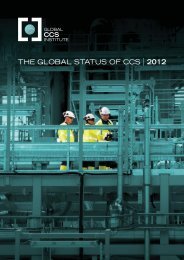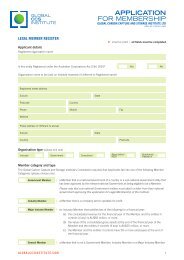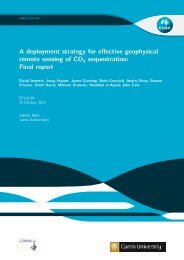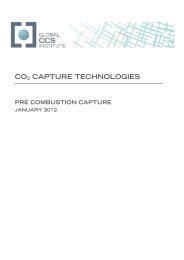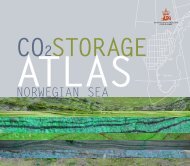Download the report - Global CCS Institute
Download the report - Global CCS Institute
Download the report - Global CCS Institute
Create successful ePaper yourself
Turn your PDF publications into a flip-book with our unique Google optimized e-Paper software.
3CHAPTER“Through <strong>the</strong>looking-glass”3. “Through <strong>the</strong> looking-glass”3.1. Introduction – four voices of four perspectivesThe first question you can ask when you look at <strong>the</strong> storyline of Rotterdamis: how could you assess this course of events in a sensible way? How couldyou draw lessons that can be used and understood by a broad variety ofinterested persons? In this chapter we will try to answer those questions byusing <strong>the</strong> voice of four differing perspectives. We used <strong>the</strong> following perspectives:1. The politician – with a politician we mean someone who is an activemember of a political party and has a current function as an executive or amember of a council (could be local, national, federal or European). Apolitician sees <strong>CCS</strong> as part of <strong>the</strong> arena where multiple public interest areconsidered and balanced and where feasibility in terms of dominion plays alarge role.2. The policy-maker – with a policy-maker we mean someone who is acivil servant and who is involved in <strong>the</strong> policy-making process aroundeconomic, innovation, energy and climate change issues; mainly at <strong>the</strong>national level at a department. A policy-maker sees <strong>CCS</strong> as (part of abroader) innovation, which fits within <strong>the</strong> dominant policy targets (such as<strong>the</strong> goals for energy security or climate change mitigation).3. The entrepreneur – with an entrepreneur we mean someone who “is anowner or manager of a business enterprise who makes money through riskand initiative” 3 . An entrepreneur sees <strong>CCS</strong> as a technology and a businesscase.4. The network organiser – with a network organiser we mean someonewho is responsible for <strong>the</strong> organisation of a <strong>CCS</strong> cluster project. The networkorganiser could also be a team of persons, like <strong>the</strong> <strong>CCS</strong> team of <strong>the</strong> RotterdamClimate Initiative that consist of member from all four partners or like<strong>the</strong> <strong>CCS</strong> team of CO 2Sense in Yorkshire (UK). The main task of <strong>the</strong> networkorganiser is to bring all relevant stakeholders toge<strong>the</strong>r, motivate <strong>the</strong>m to goahead, stimulate or push <strong>the</strong>m to carry out <strong>the</strong> next steps, attract newcompanies to enforce <strong>the</strong> cluster project and act as <strong>the</strong> support unit for all in<strong>the</strong> external world (advocacy, regulatory issues, etc.). This organisingresponsibility is supplemental to <strong>the</strong> practical responsibility for investmentof <strong>the</strong> companies involved in <strong>the</strong> cluster project. A network organiser sees<strong>CCS</strong> as a complex network project that has to be organised.What does using a perspective for an analysis mean? It means you try tolook through <strong>the</strong> eyes of a typical representative of that group. Consider <strong>the</strong>example of a politician. What are her/his priorities? Do <strong>CCS</strong> projects have animpact on o<strong>the</strong>r issues in her/his constituency, especially with regard todivision of power, <strong>the</strong> absence or presence of political support, <strong>the</strong> economiccost-benefit balance for <strong>the</strong> region? What is <strong>the</strong> network of executive/3 Definition from Wikipedia (2 December 2011; searched for “entrepreneur”)19





